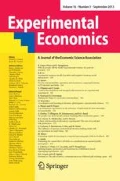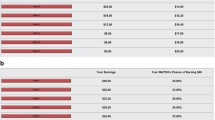Abstract
Lying to participants offers an experimenter the enticing prospect of making “others' behaviour” a controlled variable, but is eschewed by experimental economists because it may pollute the pool of subjects. This paper proposes and implements a new experimental design, the Conditional Information Lottery, which offers all the benefits of deception without actually deceiving anyone. The design should be suitable for most economics experiments, and works by a modification of an already standard device, the Random Lottery incentive system. The deceptive scenarios of designs which use deceit are replaced with fictitious scenarios, each of which, from a subject's viewpoint, has a chance of being true. The design is implemented in a sequential play public good experiment prompted by Weimann's (1994) result, from a deceptive design, that subjects are more sensitive to free-riding than cooperation on the part of others. The experiment provides similar results to Weimann's, in that subjects are at least as cooperative when uninformed about others' behaviour as they are if reacting to high contributions. No deception is used and the data cohere well both internally and with other public goods experiments. In addition, simultaneous play is found to be more efficient than sequential play, and subjects contribute less at the end of a sequence than at the start. The results suggest pronounced elements of overconfidence, egoism and (biased) reciprocity in behaviour, which may explain decay in contributions in repeated play designs. The experiment shows there is a workable alternative to deception.
Similar content being viewed by others
References
Allais, M. (1953). “Le Comportement de l'Homme Rationnel Davant le Risque: Critiques des Postulats et Axioms de l'Ecole Americaine.” Econometrica. 21, 503-546.
Andreoni, J. (1988). “Why Free-Ride? Strategies and Learning in Public Goods Experiments.” Journal of Public Economics. 37, 291–304.
Beattie, J. and Loomes, G. (1997). “The Impact of Incentives Upon Risky Choice Experiments.” Journal of Risk and Uncertainty. 14, 149–162.
Binmore, K. (1992). Fun and Games. Massachusetts: D.C. Heath and Co.
Bonetti, S. (1998a). “Experimental Economics and Deception.” Journal of Economic Psychology. 19, 377–395.
Bonetti, S. (1998b). “Reply to Hey and Starmer and McDaniel.” Journal of Economic Psychology. 19, 411–414.
Brandts, J. and Charness, G. (1998). “Hot vs. Cold: Sequential Responses and Preference Stability in Experimental Games.” Discussion Paper upfgen#321, Universitat Pompeu Fabra.
Brandts, J. and Schram, A. (1996). “Cooperative Gains or Noise in Public Goods Experiments.” Tinbergen Institute Discussion Paper #TI 96-81/1, University of Amsterdam.
Burlando, R. and Hey, J.D. (1997). “Do Anglo-Saxons Free-Ride More?” Journal of Public Economics. 64, 41–60.
Camerer, M.J. and Knez, C.F. (1995). “Outside Options and Social-Comparison in 3-Player Ultimatum Game Experiments.” Games and Economic Behaviour. 10, 65–94.
Charness, G. and Rabin, M. (2000). “Social Preferences: Some Simple Tests and a New Model.” Discussion paper, University of California, Berkeley.
Cox, J.C. (2000). “Trust and Reciprocity: Implications of Game Triads and Social Contexts.” Discussion paper, University of Arizona.
Croson, R.T.A. (1999). “Contributions to Public Goods: Altruism or Reciprocity?” Discussion paper #96-08-01, University of Pennsylvania.
Cubitt, R., Starmer, C., and Sugden, R. (1998a). “On the Validity of the Random Lottery Incentive System.” Experimental Economics. 1, 115–131.
Cubitt, R., Starmer, C., and Sugden, R. (1998b). “Dynamic Choice and the Common Ratio Effect: An Experimental Investigation.” The Economic Journal. 108, 1–20.
Davis, D.D. and Holt, C.A. (1993). Experimental Economics. Princeton, N.J.: Princeton University Press.
Fehr, E. and Gächter, S. (1996). “Cooperation and Punishment-An Experimental Analysis of Norm Formation and Norm Enforcement.” Discussion paper, University of Zürich.
Fehr, E. and Gächter, S. (1998). “Reciprocity and Economics: The Economic Implications of Homo Reciprocans.” European Economic Review. 42, 845–859.
Fehr, E. and Schmidt, K.M. (1999). “A Theory of Fairness, Competition and Cooperation.” Quarterly Journal of Economics. 114, 817–868.
Fischbacher, U., Gächeter, S., and Fehr, E. (1999). “Anomalous Behaviour in Public Goods Experiments: How Much and Why? Comment.” Discussion paper, University of Zürich.
Güth, W., Huck, S., and Ockenfels, P. (1996). “Two-Level Ultimatum Bargaining With Incomplete Information: An Experimental Study.” Economic Journal. 106, 593–604.
Hey, J.D. (1991). Experiments in Economics. Blackwell: Oxford. University Press.
Hey, J.D. (1998). “Experimental Economics and Deception: A Comment.” Journal of Economic Psychology. 19, 377–395.
Holt, C.A. (1986). “Preference Reversals and the Independence Axiom.” American Economic Review. 76, 508–515.
Isaac, R.M. and Walker, J.M. (1988). “Communication and Free-Riding Behaviour: The Voluntary Contributions Mechanism.” Economic Inquiry. 26, 585–608.
Kahneman, D. and Tversky, A. (1979). “Prospect Theory: An Analysis of Decision Under Risk.” Econometrica. 47, 263–291.
Ledyard, J.O. (1995). “Public Goods: A Survey of Experimental Research.” In J. Kagel and A.E. Roth (eds.), The Handbook of Experimental Economics. Princeton, N.J.: Princeton University Press, pp. 111–181.
Marwell, G. and Ames, R. (1981). “Economists Free-Ride, Does Anyone Else? Experiments on the Provision of Public Goods, IV.” Journal of Public Economics. 15, 295–310.
Mitzkewitz, M. and Nagel, R. (1993). “Experimental Results on Ultimatum GamesWith Incomplete Information.” International Journal of Game Theory. 22, 171–198.
Offerman, T. (1996). Beliefs and Decision Rules in Public Good Games. Dordrecht: Kluwer Academic Publishers.
Offerman, T. (1999). “Hurting Hurts More than Helping Helps: The Role of the Self-Serving Bias.” Tinbergen Institute Discussion paper TI 99-018/1, University of Amsterdam.
Roth, A.E. (1995). “Bargaining Experiments.” In J. Kagel and A.E. Roth (eds.), Handbook of Experimental Economics. Princeton, N.J.: Princeton University Press, pp. 258–348.
Savage, L. (1954). Foundations of Statistics. New York: John Wiley.
Shafir, E. and Tversky, A. (1992). “Thinking Through Uncertainty: Nonconsequential Reasoning and Choice.” Cognitive Psychology. 24, 449–474.
Starmer, C. and McDaniel, T. (1998). “Experimental Economics and Deception: A Comment.” Journal of Economic Psychology. 19, 403–409.
Starmer, C. and Sugden, R. (1991). “Does the Random-Lottery Incentive System Elicit True Preferences? An Experimental Investigation.” American Economic Review. 81, 971–978.
Sugden, R. (1984). “Reciprocity: The Supply of Public Goods Through Voluntary Contributions.” Economic Journal. 94, 772–787.
Sugden, R. (1993). “Thinking as a Team.” In E.F. Paul, F.D. Miller, Jr., and J. Paul (eds.), Altruism. Cambridge: Cambridge University Press.
Weimann, J. (1994). “Individual Behaviour in a Free-Riding Experiment.” Journal of Public Economics. 54, 185–200.
Wilcox, N.T. (1993). “Lottery Choice: Incentives, Complexity and Decision Time.” Economic Journal. 103, 1397–1417.
Author information
Authors and Affiliations
Rights and permissions
About this article
Cite this article
Bardsley, N. Control Without Deception: Individual Behaviour in Free-Riding Experiments Revisited. Experimental Economics 3, 215–240 (2000). https://doi.org/10.1023/A:1011420500828
Issue Date:
DOI: https://doi.org/10.1023/A:1011420500828




